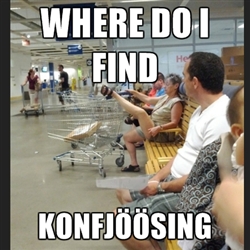I’m looking to buy some office-type furniture for our home office. So I looked in our IKEA catalog, but I didn’t really see anything that satisfied me. However, the catalog had a pointer to their IKEA Business web site, so I typed in the URL, and clicked around. It was just a bunch of marketing hype. I could not find any actual products.
 Do you remember the first time you stepped into an IKEA store? How utterly confusing it was? How you were led into the display section of the store, and the store seemed to just go on and on and on forever? How you had no idea how you would actually decide on buying any of this stuff? And how if you actually did decide you wanted something, how in the heck the process of actually buying stuff worked? How some things you have to order upstairs with a sales person, and then pay for it first downstairs at the register, and then pick it up after the register at delivery services? How other things you can’t order upstairs, and you have to go pick up yourself in the warehouse, and pay for it after you pick it up? And how other things were neither preordered upstairs, nor picked up in the warehouse, but instead were found in a section of the store called the “Marketplace”?
Do you remember the first time you stepped into an IKEA store? How utterly confusing it was? How you were led into the display section of the store, and the store seemed to just go on and on and on forever? How you had no idea how you would actually decide on buying any of this stuff? And how if you actually did decide you wanted something, how in the heck the process of actually buying stuff worked? How some things you have to order upstairs with a sales person, and then pay for it first downstairs at the register, and then pick it up after the register at delivery services? How other things you can’t order upstairs, and you have to go pick up yourself in the warehouse, and pay for it after you pick it up? And how other things were neither preordered upstairs, nor picked up in the warehouse, but instead were found in a section of the store called the “Marketplace”?
I’ve been shopping at IKEA stores since 1979, so this doesn’t confuse me anymore. But I was thinking about this as I read an article in the Washington Post by Dylan Matthews called “Is Sweden awesome because it mooches off the U.S.?” The article links to a new economic model that predicts that “cuddly capitalist” states like Sweden really only work when there are “cutthroat capitalist” states like the US operating alongside it.
I don’t really have any opinion on how valid or useful that economic model is. I suppose it sounds plausible. But as Matthews points out, Sweden isn’t exactly a good example of cuddly capitalism anymore, while the US isn’t a pure example of cutthroat capitalism, either. Sweden has had a right-wing government for half a decade now, while America has been run by a left-wing president. Sweden isn’t as “awesome” as some American left-wingers seem to think, nor is it as dystopian as some American right-wingers do. I don’t think that the differences between the countries are a simple as a two-dimensional scale of with “capitalism” and “socialism” on the other. There are lots of other differences, too, like culture.
* * *
“Cuddly capitalism” is a weird term. IKEA isn’t cuddly. It’s a user-interface nightmare. It’s designed for the efficiency of the organization, not for the benefit of the customers. And IKEA isn’t alone. When I visited Sweden this summer, I found that the whole country seems to operate on this mentality. It’s a country of the bureaucracy, by the bureaucracy and for the bureaucracy. And I’m not just talking government bureaucracies here. IKEA is as capitalist as they come. It’s everywhere.
I went into a Burger King at one point to get some fast food for my kids who were getting cranky. I tried to see what they had on their menu, and how much my choices cost. They didn’t have a menu, just some gigantic photographs of about five different value meals to choose from. What if I don’t want a value meal, just some hamburgers? What did that cost? I couldn’t find the information. So I said, forget it, I’ll just go next door to McDonalds.
When I went to McDonalds, same thing. No list of what they sell, just five gigantic pictures of their extra value meals. I went up to the counter. “Do you have a menu somewhere I could look at?” I asked. “No, unfortunately, we don’t,” she said.
A restaurant without a menu! The concept had never occurred to me. I guess they just assume that their customers have been there before, and already know exactly what they want, and don’t care how much any of it costs.
Everywhere I went in Sweden, I started noticing the same thing. Buses, subways, airports, grocery stores, convenience stores…a sort of implicit assumption that everybody already knows how their crazy system works. (And trains. Don’t get me started on how horrible it is to interact with the Swedish Railway system.) Every time I tried to ask for help, I got snippy answers from annoyed customer service agents. “Of course, you can’t buy that kind of subway ticket from me, a subway employee, here in this booth at the subway station gates where I sell many other kinds of subway tickets to many other subway customers, you have to go next door into the convenience store to buy that kind of ticket. Don’t you know anything, you idiot?” they said with their tone of voice if not their actual words.
When I complained to my wife about how unhelpful these people are, she said she never experiences that in Sweden. “But I always ask in English. Why don’t you try asking in English yourself next time?”
So I started doing exactly that. Even though I can speak Swedish quite fluently, for the rest of the trip, whenever I needed any customer service at all, I asked in English instead of Swedish. And…magic! All of a sudden, people were quite nice to me! “Of course, I’ll help you, you poor dumb American who has never seen or experienced our advanced civilization before, I’d be happy to help you navigate through the finer details of our wonderfully efficient system.”
I’m sure these Swedish organizations sure are indeed efficient, from point of view of the organization, not the customer. But this organizational efficiency can exist only because Swedish culture tolerates it. As a Swede, you are expected to conform to the way things are organized. If Swedes had a more confrontational and unconformist culture instead of a consensus-driven one, these unfriendly user experiences would have to change, because the confrontations would start costing them too much.
* * *
When I want cheap furniture that I can pick up today and bring home with me immediately, nobody is better than that than IKEA. They are masters at packing large furniture into small flat, car-sized boxes at low prices. As Clayton Christensen points out in his book “How Will You Measure Your Life?”:
It’s fascinating that in forty years, nobody has copied IKEA. Think about that for a second. Here is a business that has been immensely profitable for decades. IKEA doesn’t have any big business secrets–any would-be competitor can walk through its stores, reverse-engineer its products, or copy its catalog … and yet nobody has done it.
I wonder if would-be competitors walk through IKEA’s stores and get as confused as the customers. They somehow think that the whole key to IKEA’s success is this overwhelming, confounding customer experience. Potential competitors can’t understand it or imagine how to replicate it, so they don’t bother.
The customer doesn’t hire IKEA because they want a confusing experience. They hire IKEA because the job to be done is cheap furniture which can be easily transported home. A confusing customer experience isn’t necessary, it’s just happens to be that way, because it’s more efficient for IKEA to do it that way, because Swedish culture let such unusual operational processes grow into being.
But there’s no reason that someone can’t create a furniture company focused on low prices, transportability AND a pleasant customer experience. The potential is lurking there under the surface, like a clerk waiting to be asked a question in English instead of in Swedish.

 Do you remember the first time you stepped into an
Do you remember the first time you stepped into an 

